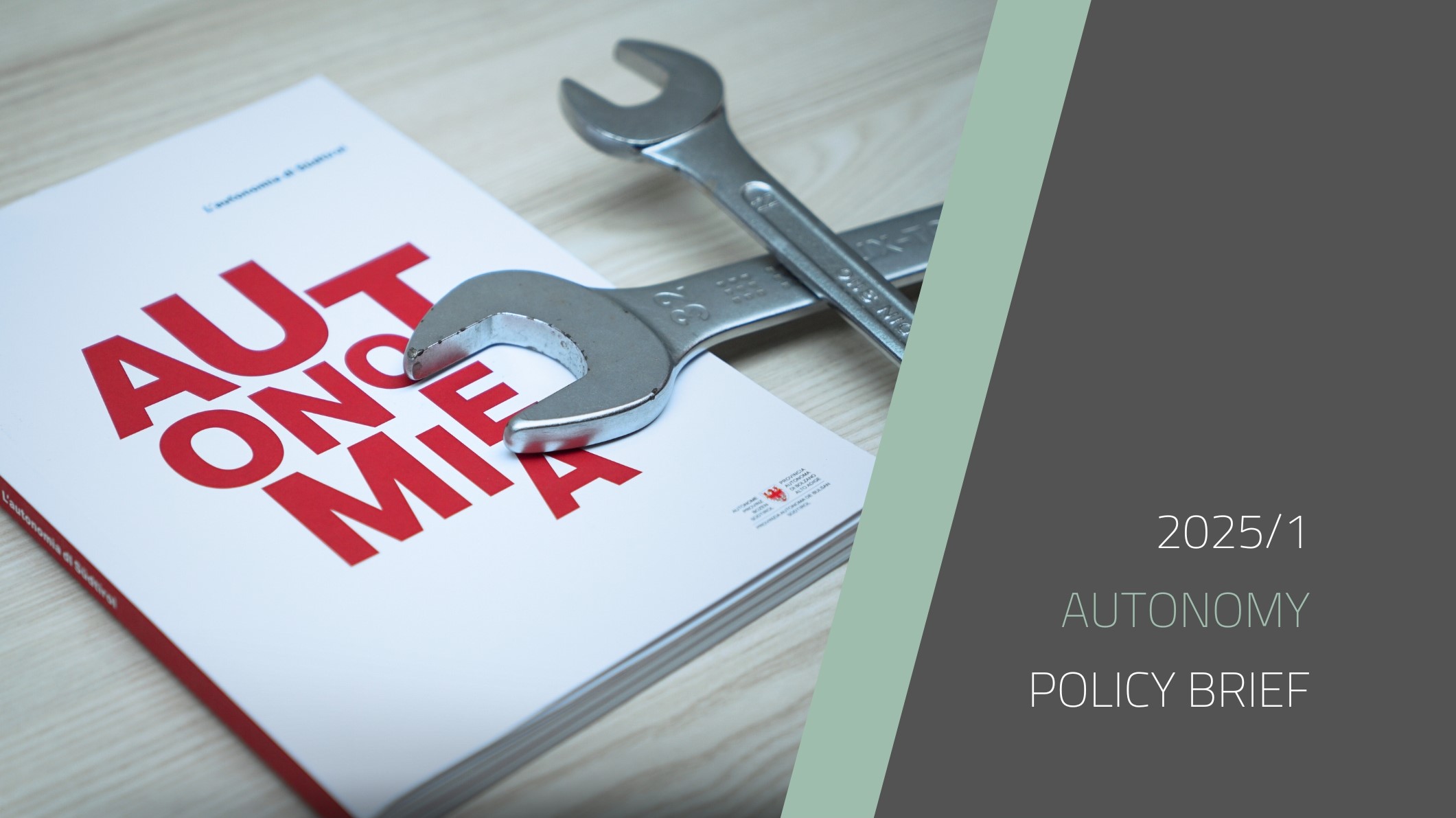This policy brief provides an overview of the recent reform of the Autonomy Statute.
Particularly in the wake of the Italian constitutional reform of 2001, and even prior to it, the jurisprudence of the Constitutional Court has led to an increasing restriction of South Tyrol’s autonomous legislative powers. The starting point for negotiations was a related statement made by the Italian Prime Minister, Giorgia Meloni, in 2022. From the South Tyrolean side, a corresponding reform proposal for the Region of Trentino- South Tyrol was presented by Governor Arno Kompatscher in the South Tyrolean Provincial Council in May 2024. After lengthy negotiations between the State and the Region, an agreement was reached in April 2025.
Published on 15 April 2025
Marc Röggla
Linguistic and Symbolic Adjustments
The terminology of the Autonomy Statute is aligned with the vocabulary introduced by the 2001 constitutional reform. This includes changes such as renaming the “Region Trentino-Alto Adige” to “Region Trentino-Alto Adige/Südtirol” as well as replacing the terms “Province” and “Provinces” with “Autonomous Province” and “Autonomous Provinces”.
Limits to Autonomy (Art. 4 and Art. 5 of the Autonomy Statute)
The limitations of autonomy are revised. The previous limitation referring to the “fundamental provisions of the economic and social reforms of the Republic” is repealed. The limits deriving from the “principles of the legal system of the Republic” will henceforth be referred to as the “general principles of the legal system of the Republic.” However, the constraints arising from the Constitution, the national interest, EU law, and international obligations are maintained. The fundamental principle of the protection of linguistic minorities is likewise reaffirmed.
The Region’s and Autonomous Provinces’ primary legislative competence is now expressly defined as “exclusive legislative power.” Regarding concurrent or secondary legislative powers, the restriction is refined to refer to “essential principles” (no longer merely “principles”).
Extension and Clarification of Autonomous Competences (Art. 4, Art. 8, and Art. 9 of the Autonomy Statute)
Autonomous competences are expanded in several areas:
Point 1: In the area of provincial offices and personnel, competence is extended to include the regulation of employment relationships and collective agreements.
Point 5: Competence in spatial planning is broadened under the term “spatial development,” encompassing construction, planning, and zoning.
Point 17: Competence now includes roads, water supply systems, and public contracts, including procurement procedures and the execution phase of public works, services, and supply contracts.
Point 19: Competence extends to the assumption into direct administration, establishment, organization, operation, and regulation of public services of provincial and local interest, including waste management.
Point 24: A new competence is introduced for small and medium-scale water diversions for hydroelectric purposes.
New Points 29-bis and 29-ter: New competences are introduced in environmental protection and ecosystems, including wildlife management, and in the area of commerce. The latter is consequently removed from the scope of concurrent legislative powers (Art. 9 of the AutonomyStatute).
New Powers of the Provincial Governors (Art. 20 of the Autonomy Statute)
The provincial governors are granted powers in public safety with regard to wildlife management. However, authority in weapons and ammunition law, permits, and sanctions remains with the State.
Electoral Law and Residency Requirement (Art. 25 of the Autonomy Statute)
The residency clause is amended. Previously, four years of residence in the Autonomous Region of Trentino-South Tyrol were required for the right to vote. Now, for exercising active voting rights in the Province of Bozen/Bolzano, two years of uninterrupted residence in the Region are required. For the Province of Trento, one year of uninterrupted residence in the Province is needed.
Upon acquiring two years of uninterrupted residence in the Region, one is entered into the electoral register of the municipality in the province where they resided the longest during this period, or, if equal, of the most recently inhabited municipality.
An additional innovation concerns the so-called “historic residence”: Upon transferring one’s residence to the Province of Trento or Bozen/Bolzano, one is immediately entered into the electoral register if they had previously resided there and already fulfilled the conditions for active voting rights in the Province.
Appeal of Provincial Laws before the Constitutional Court (Art. 47, Art. 55, and Art. 98 of the Autonomy Statute)
This reform clarifies the promulgation process and the deadline for the State to challenge provincial laws: Provincial or regional laws are promulgated within 30 days by the Governor or the President of the Region. The State may challenge such laws before the Constitutional Court within 30 days.
Going forward, it is the Provincial Government and not the Provincial Council that decides whether to challenge State laws.
Regulations on the Formation of Political Bodies at the Provincial and Municipal Level (Art. 50 and Art. 61 of the Autonomy Statute)
It is now possible for the Provincial Council to decide by absolute majority that the composition of the Provincial Government shall be based on the outcome of the most recent linguistic group census. If such a resolution is not adopted, the composition of the Government continues to be based on the strength of linguistic groups in the Provincial Council.
If there is a Ladin representation in the Provincial Government, the allocation of the remaining government members is regulated proportionally in relation to the other linguistic groups.
In the municipalities of the Province of Bozen/Bolzano, the Municipal Council may now, by absolute majority, appoint a representative to the Municipal Executive for a linguistic group even when only one councilor of that group is present (previously, at least two were required).
Amendment of the Autonomy Statute – Mutual Consent Clause (Art. 103 of the Autonomy Statute)
Amendments to the Autonomy Statute are now nationally subject to mutual agreement. Such amendments can no longer be enacted unilaterally by the Italian Parliament but must be approved by absolute majority in the Regional Council and both Provincial Councils. The basis for this is the text approved in the first reading in the Italian Parliament.
If the amendment is not approved by the Provincial Council or the Regional Council, the Chambers of Parliament may adopt it in second reading by absolute majority of their members, provided that existing autonomy provisions remain unaffected.
Enhancement of Enactment Decrees (Art. 107 of the Autonomy Statute)
Enactment decrees are intended to also include regulations that harmonize legislative powers between the State and the Region/Provinces.

